Mitt Romney Easily Wins Utah Senate Primary
After hitting a stumbling bloc in April, Mitt Romney coasted to a win last night, and has a clear path to Washington and the U.S. Senate.
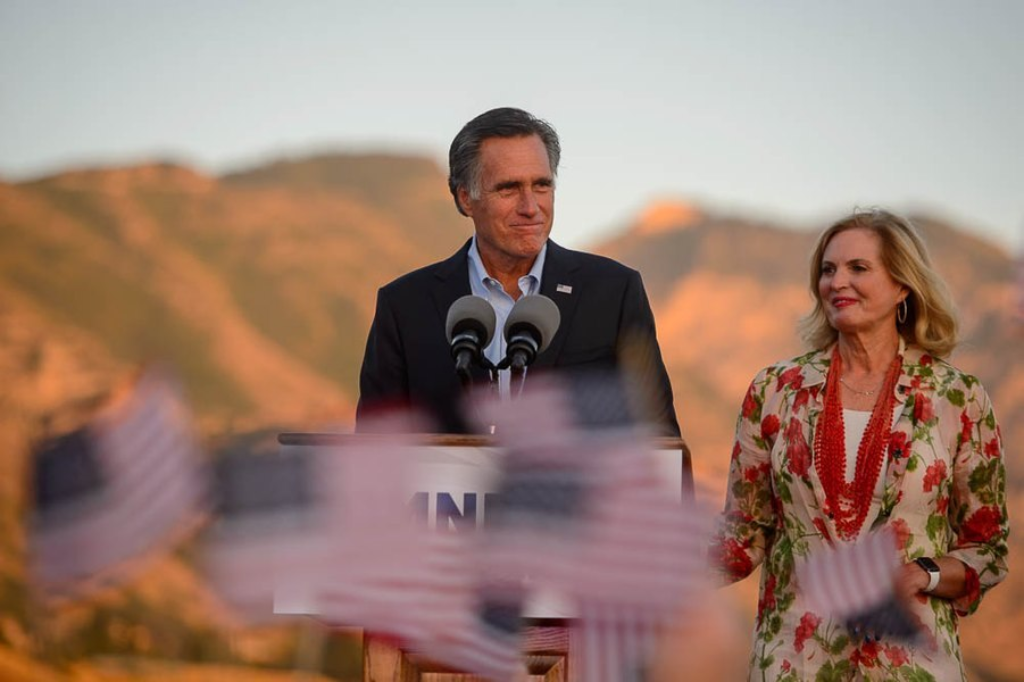
Former Massachusetts Governor and 2012 Republican Presidential nominee Mitt Romney coasted to an easy victory over his rival in yesterday’s Republican Senate primary in Utah:
SALT LAKE CITY — Flashing his trademark smile and touting a patched-up relationship with the president, Mitt Romney rolled through the Republican primary in his adopted Utah on Tuesday and took another step in his political comeback that would have him assume the Senate seat of retiring Orrin Hatch.
President Donald Trump congratulated Romney on the landslide victory, tweeting that “a great and loving family will be coming to D.C.”
Romney celebrated the win at sunset in front of picturesque mountains, surrounded by his wife, Ann, and some of their children and grandchildren as supporters munched hot dogs and snow cones.
The former presidential candidate promised to “make sure that the example I set as a leader is consistent with the values of our state and the great founding values of the United States of America” in Washington.
Romney has said he’ll speak out if the president says or does anything “significant” that is racist, sexist or anti-immigrant. But his tone has changed markedly since the 2016 presidential campaign, when he blasted Trump as a “phony” and a “fraud.”
This year, Romney predicted Trump will be re-elected and accepted the president’s endorsement in the Senate race.
Romney defeated GOP state lawmaker Mike Kennedy, who had forced him into a primary by winning the vote of a hard right-leaning group of core GOP party members at the state convention in April. Neither received 60 percent of delegates’ votes to secure the nomination outright.
During the campaign, Kennedy tried to paint his political-heavyweight opponent as an out-of-towner who couldn’t get along with Trump, but those attacks didn’t make much headway.
Kennedy said Tuesday he’s happy to back Romney as he goes up against Democrat Jenny Wilson in the general election.
Wilson promised a hard race Tuesday, saying in a statement that the country needs “a new generation of leaders” and criticizing him on immigration and tax policies.
Wilson will be the underdog in deep-red Utah, which has not sent a Democrat to the U.S. Senate for decades.
Romney moved to Utah after his failed 2012 presidential run. He’s known there for turning around the 2002 Salt Lake City Olympics after a bribery scandal and later becoming the first Mormon presidential nominee of a major political party.
The well of goodwill also extends to voters who support the president.
Bruce Rigby, 84, said he admires Romney for speaking his mind, but he’s also glad he has since come around to largely supporting the president.
“It’s like in a family. One person may not like the decision that someone makes, but it all comes out in the wash,” said Rigby, a retired manager concrete and propane companies.
There are lingering questions for people like Emery Cook, a 34-year-old business owner who said he hopes Romney is a “true conservative” on issues like opposing abortion and strengthening border security.
“I hope he stands up to Trump when he needs to stand up to Trump, and I like that about Mitt,” he said.
More from The Salt Lake City Tribune:
Mitt Romney hardly broke a sweat on his way to capturing the Republican nomination in Utah’s U.S. Senate race, according to unofficial results Tuesday, earning 73 percent of the vote.
Romney’s opponent, state Rep. Mike Kennedy, R-Alpine, drew only about one of four votes counted by Tuesday night. Late-arriving by-mail ballots will continue to be tallied in coming days.
“Well, it looks like our team won the primary,” Romney said to a cheering crowd.
The Associated Press called the election for Romney at 8:24 p.m. and Romney and his wife, Ann, delivered brief remarks at 8:40 p.m.
By 9 p.m., an hour after polls closed, the crowd was dissipating, leaving a core group of sign-waving supporters chanting “We want Mitt,” for the evening news cameras.
Kennedy conceded before 10 p.m., reported FOX 13. About the same time that President Donald Trump tweeted his congratulations, saying “I look forward to working together — there is so much good to do.”
Romney wished well to his Democratic opponent, Jenny Wilson, whom he will face in November’s general election to fill the seat of retiring Sen. Orrin Hatch.
To be a great nation, Romney said, the United States must be strong. The country should live within its means as Utah does, and welcome refugees and immigrants who legally enter the country and add vitality to the nation.
“We believe that free people make better choices than the government,” Romney said, “And that the state government makes better choices than the federal government.”
The former Massachusetts governor moved to Utah in 2014 after it looked like he was retired for good from political campaigning. Then his name became part of monthslong speculation about whether Hatch would seek an eighth term.
(…)
In a statement, Wilson congratulated Romney on his win and said she looks forward to an issue-based debate.
“This Senate seat belongs to the people of Utah and for the first time in over 40 years, Utahns will be electing someone new to serve them,” Wilson, a Salt Lake County Council member, said. “It’s important Utahns look at the motivations of their options. I am not running to be relevant on the national scene but rather to serve Utah, as I have done throughout my life of local public service.”
Romney’s decisive win comes after a slight stumble at the state Republican convention when he failed to secure the support of 60% of the delegates in attendance that would have been needed to win the nomination without having to face a primary. At the time, though, it was apparent that Romney’s campaign had already anticipated that this would happen and had already gathered a sufficient number of signatures to appear on the primary ballot even before the convention had begun. This caused some political observers in the state to argue that Romney fell short in part because of the concerns that some delegates had about the carpetbagging allegations made against him by some of his opponents and in part because delegates to the convention saw his signature-gathering efforts as something of a slap in the face and an effort to make an end run around their prerogatives in the party process.
Even after that somewhat embarrassing setback, though, it was apparent that Romney was likely to coast to an easy win in his primary race against state legislator Mike Kennedy. Along with retiring Senator Orrin Hatch, his fellow Senator Mike Lee, and Governor Gary Hebert, Romney entered the race as one of the most popular Republicans in Utah. This is most clearly indicated by the results of the 2012 Presidential race in which he won the state by nearly half a million votes, the largest margin of any Republican or Democratic candidate since Utah became a state. In previous years, Romney won the state in that year’s Republican primary by an even larger margin in no small part because his opponents that year didn’t even bother to contest the state. The same thing happened in the Utah primary in 2008, which Romney won with 93% of the vote. In 2008, Romney won the Republican primary by more than 250,000 votes. Furthermore, a poll taken last September indicated that Romney would win rather easily in a General Election against virtually any conceivable Democratic opponent. Given all that, it seems clear that Romney would easily win in November. Taking all of this together, and adding in the fact that Romney raised far more money than his opponent, Romney’s decisive win last night was somewhat of a foregone conclusion.
In November, Romney will face Jenny Wilson, who serves as a member of the Salt Lake City Council and was an unsuccessful candidate for Mayor of Salt Lake City in 2007. In reality, though, it is likely that the General Election will end up being a mere formality standing between Romney and a political comeback that will, after unsuccessfully seeking the Presidency twice, finally put Romney in Washington albeit in a different role than he may have anticipated in the past. There hasn’t been very much head-to-head polling of a Romney vs. Wilson match, but what has been done shows Romney easily defeating his Democratic opponent and, absent some kind of unlikely change of circumstances, Romney will easily defeating Wilson in just over four months. For this reason, all three of the major political rating services — the Cook Political Report, the Rothenberg Report, and Larry Sabato’s Crystal Ball — all rate the seat as safely Republican. So, I suppose it’s time to start getting used to saying “Senator Mitt Romney.”
Romney’s win also comes just a few days after he took the somewhat unusual pre-primary step of effectively declaring independence from the President, and vowing to speak out against the President when he felt it appropriate:
Utah Senate candidate Mitt Romney pledged Sunday to be an independent voice within the Republican Party if he is elected and to speak his mind, good or bad, about President Donald Trump.
“People ask me why I feel compelled to express my disagreements with the president. I believe that when you are known as a member of a ‘team,’ and the captain says or does something you feel is morally wrong, if you stay silent, you tacitly assent to the captain’s posture,” Romney wrote in an op-ed published Sunday by The Salt Lake Tribune. “I appreciate the argument made by those who believe we should stay silent, but I cannot subscribe to it.”
(…)
[W]hile Romney has continued to speak out against Trump, his rhetoric directed at the president has been sparing. The GOP Senate candidate wrote in his op-ed that “the first year of his administration has exceeded my expectations,” noting reforms to the corporate tax code, regulatory cuts and changes to federal land in Utah.
Romney pledged that he “will continue to speak out when the president says or does something which is divisive, racist, sexist, anti-immigrant, dishonest or destructive to democratic institutions” but added that he has not made his criticism into “a daily commentary” and that he only weighs in “when I believe it is a matter of substantial significance.”
“A critical part of being president is shaping domestic and foreign policy. Just as important, the president of the United States shapes the character of our country,” Romney wrote. “I sometimes wonder which has the more lasting effect, policy or character? I hope for both.”
Here’s how Romney put it in the Op-Ed:
I will support the president’s policies when I believe they are in the best interest of Utah and the nation. I have noted, the first year of his administration has exceeded my expectations; he made our corporate tax code globally competitive, worked to reduce unnecessary regulations and restored multiple use on Utah public land. In addition, I am pleased that he backed away from imposing a 35 percent tariff on all foreign goods.
But I have openly expressed my disagreement with certain of the administration decisions such as the withdrawal from the Trans-Pacific Partnership (TPP); I want more markets open for Utah and American goods. I also oppose broad-based tariffs, such as those proposed on steel and aluminum, particularly when they are imposed on our allies. I agree, however, with narrower penalties levied on companies or nations that employ unfair trade practices, such as China.
I have and will continue to speak out when the president says or does something which is divisive, racist, sexist, anti-immigrant, dishonest or destructive to democratic institutions. I do not make this a daily commentary; I express contrary views only when I believe it is a matter of substantial significance.
People ask me why I feel compelled to express my disagreements with the president. I believe that when you are known as a member of a “team,” and the captain says or does something you feel is morally wrong, if you stay silent you tacitly assent to the captain’s posture.
Dr. Martin Luther King noted, “our lives begin to end the day we become silent about things that matter.” I appreciate the argument made by those who believe we should stay silent, but I cannot subscribe to it. I know that any criticism may lessen the president’s flexibility to enact policy with which I agree, but that end does not justify my silence in the face of things that matter.
A critical part of being president is shaping domestic and foreign policy. Just as important, the president of the United States shapes the character of our country; Presidents Washington, Adams, Lincoln, Roosevelt, Eisenhower, Reagan and Bush all impacted the character of who we are as a people. I sometimes wonder which has the more lasting effect, policy or character? I hope for both.
This is a much more muted position than Romney took during the 2016 Republican primary race when he came forward and denounced Trump in a manner that even his Republican opponents had failed to do. That statement came at a time when Trump was already on a clear path toward winning the nomination and when some were openly speculating that Romney could become a third-party challenger to Trump in the General Election. While that never took place, Romney never did join his fellow Republicans in supporting Trump after he won the nomination and later revealed that he had written in his wife Ann Romney rather than voting for Trump in the General Election. Shortly after the election, though, Romney seemed to soften on Trump a bit, especially when it was being speculated that Trump could choose him to be Secretary of State. That also did not materialize, of course, and Romney has been rather muted in his comments on Trump up until this Op-Ed, in no small part because of his interest in succeeding Orrin Hatch in the Senate and the reality of running for Senate. In any case, now that he’s on a clear path for a seat in the Senate, it will be interesting to see where he falls in the Republican Party and the extent to which he becomes the center of a conservative opposition to the President as many people seem to be hoping.
Photo via Salt Lake City Tribune

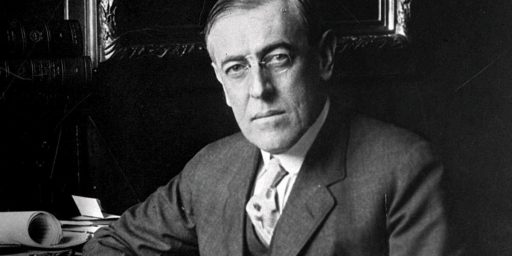
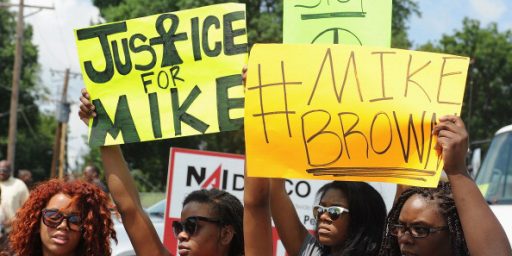
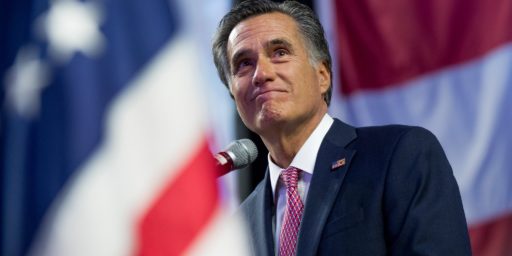
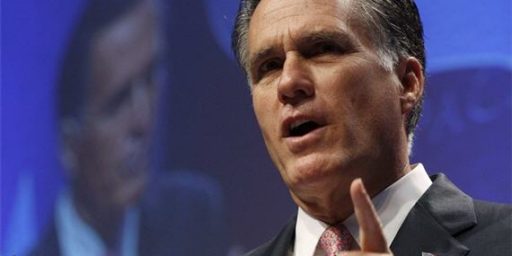
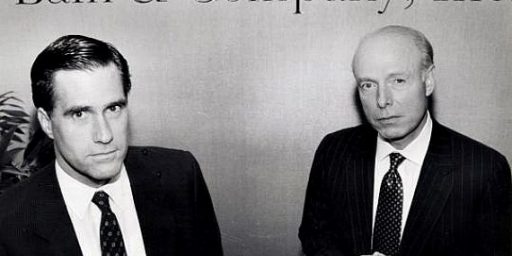
Maybe he can start a knitting circle in the Senate.